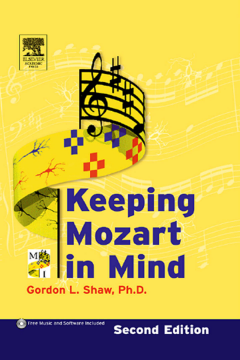
Additional Information
Book Details
Abstract
The demand for math and science skills in our technology-driven world is at a premium, and yet U.S. students continue to lag behind many other industrialized countries in these areas. This book, based on studies conducted on 8000 elementary school-aged children, proposes that not only is there a relationship between music and math comprehension, but that music can be utilized to heighten higher brain function and improve math skills. The enclosed CD-Rom includes (1) a recording of Allegro con spirito from Sonata for Two Pianos in D Major (K. 448), by Wolfgang Amadeus Mozart, performed by Murray Perahia and Radu Lupu, courtesy of Sony ClassicalTM, and (2) a descriptive interactive version of S.T.A.R.TM (Spatial-Temporal Animation Reasoning) software program. While this book's discussion of the breakthroughs in understanding of spatial-temporal reasoning abilities will be of particular interest to neuroscientists and cognitive researchers, the book is also accessible to parents and educators.
- Presents the theory that music exercises higher brain function and can enhance math comprehension
- Details how music training coupled with special-temporal reasoning (thinking in pictures) can dramatically impact a child's ability to understand and master math
- Includes an interactive CD-ROM with math games
"Gordon Shaw and the M. I. N. D. Institute has made such great progress, spreading a wider net to help our students..."
— Drs. Diane Watanabe and Richard Sjolseth, consultants at the Institute of Learning, Teaching and the Human Brain in the Division of Curriculum and Instruction at the Los Angeles County Office of Education
"...All together this is a very important book for all those interested in improving mathematics education, be they teachers, researchers, or parents."
—Professor Martin Perl at SLAC, Stanford University, 1995 Nobel Laureate in Physics
"'Music hath charms...' and Dr Shaw and the M.I.N.D. Institute now clearly show that these charms extend to spatial and temporal reasoning in a form that can be harnessed as part of the educational process. Keeping Mozart in Mind can be read with equal interest by parents and educators and by experts in the field of cognitive neuroscience."
—Professor Edward G. Jones, M.D., UC Davis, past President of the Society of Neuroscience
"The book describes in a lucid form the discovery and application of a new approach to the teaching and understanding of mathematics and music. ...a 'must read' for any educator or parent of school age children."
—William A. Little, Professor of Physics, Emeritus, Stanford University
"The brain research upon which this program is based is ground-breaking and provides us with a new pathway to reach students who are struggling with their understanding of mathematics..."
—Claudia Kreis, Principal of Burnett Elementary School, Long Beach, California
